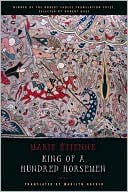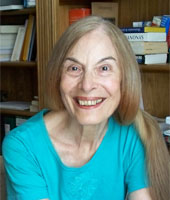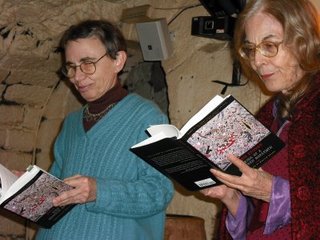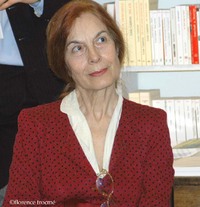Marilyn Hacker’s translation of Marie Étienne’s eleventh book of poems, King of a Hundred Horsemen, represents the first ample introduction of the work of this restlessly inventive French literary figure to an English-reading audience. Born in 1938 in Menton, Étienne spent most of her childhood in Vietnam and Senegal. The works for which she is best known — her theatrical collaborations with Antoine Vitez, memoir, poetry, novels and experimental prose, short stories, reviews, essays, and anthology editing — were mainly accomplished after her fortieth birthday.
 In her preface, Hacker positions Étienne as a rare integrator of traditions and trends, embracing both Verlaine and Mallarmé, the tampering with history of Duras and Yourcenar, the loosened voices of Scève and Cixous. I also hear the fragmentary interrogations of Edmond Jabès. Hacker finds in Étienne’s poetry “the synthesis of the contemporary and the classical, of the tragic, of the quotidian transformed by the prisms of myth and history.” This absorbent aspect of Etienne’s sensibility makes it difficult to categorize her style—but perhaps explains why King of a Hundred Horsemen was an attractive assignment for Hacker, a master formalist with a flair for the contemporary. Étienne’s book houses a shattered narrative in a symmetrical form. Here is a sample from the sequence titled “The Assassin’s Denial”:
In her preface, Hacker positions Étienne as a rare integrator of traditions and trends, embracing both Verlaine and Mallarmé, the tampering with history of Duras and Yourcenar, the loosened voices of Scève and Cixous. I also hear the fragmentary interrogations of Edmond Jabès. Hacker finds in Étienne’s poetry “the synthesis of the contemporary and the classical, of the tragic, of the quotidian transformed by the prisms of myth and history.” This absorbent aspect of Etienne’s sensibility makes it difficult to categorize her style—but perhaps explains why King of a Hundred Horsemen was an attractive assignment for Hacker, a master formalist with a flair for the contemporary. Étienne’s book houses a shattered narrative in a symmetrical form. Here is a sample from the sequence titled “The Assassin’s Denial”:
48. A two-story house.
Lam and his wife sleep upstairs.
They shouldn’t, because the ground floor door stays open to the passing hordes.
The next day on the sidewalk, at the foot of the stairs, they find father and sister felled during the night.
Lam accuses his wife: who if not she is the janitor?
During this time, the door remains open for a stranger who comes in and prowls around.
It is the assailant. What is he looking for?
Outside, a couple passes by: — When will we see each other again?
Two women in bedroom slippers:
How’s the dog?
He’s in the fountain, he’s having his bath.
The street makes up for the frightful mess within.
Misfortune, thinks Lam, is nothing but a yellow spotlight on the stage floor.
To exit, take a step aside.
King of a Hundred Horsemen is a string of nine sequences, each including ten prose-poem sonnets, and each sonnet made of lines that are complete sentences. (This edition is bilingual.) A speculative mind persists by way of this deliberate structure, a dream-body with just enough connective tissue to suggest motion, but not momentum or direction. This cerebral speaker narrates his/her own “war diary,” describes the travels of Ang and Lam (South Asian royalty? refugees?), and follows “the child,” a sort of free-agent sprite who may or may not be pulling the strings. Each sequence sketches a location, suggests an anxious need or pending threat, drifts into tiny anecdote, and voices the questions or assertions of the characters.
 At first it seems essential to describe the set-up and fictive elements of King of a Hundred Horsemen because Étienne and her mode are strangers to us. But the reader’s excitement derives from the antagonism between the dedication to form and the capriciousness of narrative. This, in fact, reenacts the vague but overriding problem facing the war diarist and Ang/Lam: the human world, driven by embedded behaviors and beliefs, is based on a profound misunderstanding, an irrepressible urge to wield power and impose order on our wayward spirits. The stunning effects of King of a Hundred Horsemen come from sustaining this antagonism even while the reader cannot help but try to assemble the story’s pieces into something we recognize as “coherent.” The “innerness” of the warped narrative, the coming-to-awareness of an overwhelming situation (war, exile, intrigue, fatelessness, inadequate language and understanding) functions like the trembling of intuition. The empathy that Étienne feels for her reader is often heard in the aphoristic echoes of her narrator’s affecting observations.
At first it seems essential to describe the set-up and fictive elements of King of a Hundred Horsemen because Étienne and her mode are strangers to us. But the reader’s excitement derives from the antagonism between the dedication to form and the capriciousness of narrative. This, in fact, reenacts the vague but overriding problem facing the war diarist and Ang/Lam: the human world, driven by embedded behaviors and beliefs, is based on a profound misunderstanding, an irrepressible urge to wield power and impose order on our wayward spirits. The stunning effects of King of a Hundred Horsemen come from sustaining this antagonism even while the reader cannot help but try to assemble the story’s pieces into something we recognize as “coherent.” The “innerness” of the warped narrative, the coming-to-awareness of an overwhelming situation (war, exile, intrigue, fatelessness, inadequate language and understanding) functions like the trembling of intuition. The empathy that Étienne feels for her reader is often heard in the aphoristic echoes of her narrator’s affecting observations.
 The series begins with “Ocean/Emotion,” spoken by a near-Étienne reflecting on her childhood: “I could tell you how for a long time I thought my memory was paralyzed: twenty years passed outside France and what have I left of it?” Memory is an inadequate recourse to assembling an identity: “I have forgotten Suez, the significant canal, I’ve only kept the command, which was not to forget, the sensation of my height above the sea, the uneasiness. How not to fall? / I hold on to images.” So do we all. But an awakening is required, not into the comforts of conclusiveness, but into a sufficing language. “And then one day, I pronounced words with my voice, I made movements with my body, we were acting in the theater, at least we were learning to, each part of me became clairvoyant.” Treated as pertinent fragments, Etienne’s autobiographia obtain a fictive allure and prepare the reader to discover an adequate yet tentative language, a way to measure up against one’s provisional experience of the world. She introduces material by other writers, such as Marina Tsvetaeva: “The sea, says Marina, is insurmountable and humiliating. / ‘… dictatorship, Boris, and wounded pride.’” The failed moral structures have the same effect:
The series begins with “Ocean/Emotion,” spoken by a near-Étienne reflecting on her childhood: “I could tell you how for a long time I thought my memory was paralyzed: twenty years passed outside France and what have I left of it?” Memory is an inadequate recourse to assembling an identity: “I have forgotten Suez, the significant canal, I’ve only kept the command, which was not to forget, the sensation of my height above the sea, the uneasiness. How not to fall? / I hold on to images.” So do we all. But an awakening is required, not into the comforts of conclusiveness, but into a sufficing language. “And then one day, I pronounced words with my voice, I made movements with my body, we were acting in the theater, at least we were learning to, each part of me became clairvoyant.” Treated as pertinent fragments, Etienne’s autobiographia obtain a fictive allure and prepare the reader to discover an adequate yet tentative language, a way to measure up against one’s provisional experience of the world. She introduces material by other writers, such as Marina Tsvetaeva: “The sea, says Marina, is insurmountable and humiliating. / ‘… dictatorship, Boris, and wounded pride.’” The failed moral structures have the same effect:
The war lasted a long time. When someone went out, they didn’t come back, or came back rouged with blood.
The banker’s wife churned butter in the garden, rings on her fingers.
I intended to live at least to see. I did not see much.
For there’s the moral order, and below it, inextricable, the great tablets of the law.
Even fate loses its force there.
The third sequence, “War Diary,” includes the first of several sonnets dealing self-reflectively with the nature of language: “30. January. No one writes poetry any longer, bric-a-brac in an old hardware store. / What credence can be granted to words following each other, how can they still be thought possible?” It is Ang, introduced in the second sequence, who talks of “L’effort pour être au monde,” the effort to be in the world, the weariness of continuing to make sense. But the speaker’s disclaimers only serve to increase the hunger for a language that could succeed—and which the narrator seems on the brink of providing. Etienne’s poetry suggests that by enacting a series of surpassing failures, at least we manage not to succumb to a degrading completion. “33. Precision which turns, which ponders and which sings. / No rumination. Inflections and refrains. / The sentence rather than the line. / Delivered over to the movement but dependent. Freely dependent.”
Apparently in fear of his wife, Lam (who may be a king) flees through these poems the way one rushes about in dreams. In “The End and the Beginning” he is part of an audience waiting for a performance to begin. There is a discussion about time and linearity in art. But then Lam awakens—he has been dreaming. Suddenly, he is walking through an airport in Atlanta, then among the Finger Lakes. In part 77, “Lawrence Ferlinghetti takes Lam for a walk.” There are stretches in these poems where one must simply go along for the ride. But Etienne works over a relatively stable set of preoccupations that provides context and resonance: the building and dismantling of narrative, East and West, the familiar and the foreign, the house and the journey, fearfulness and exploration, the limits of gender, the realms of the erotic.
In the book’s final sequence, “Some of Them Are Japanese,” mysterious migrating creatures, bird-like and metamorphically human, venture to the equator, “Even in cages they keep moving.” But they are massacred, exterminated: “The storm exterminated them, sold wholesale on the marketplace, dead skin, useless meat. / Threw them to the pigs, used them for fertilizer.” Perhaps here Etienne transposes her father’s war experiences as a POW in a Japanese camp and a survivor of horrors:
Their language too had been exterminated.
This proves that even the best singing does not suffice.
To hold your territory, your female.
It’s also necessary to fly at night.
Never to return, even years later, to a dangerous spot.
To continue otherwise and elsewhere.
To be a better singer, a better fighter.
 In the proper spirit of an experimentalist, Étienne ends her book without clicking it shut. Instead, she implies that through her book she has been “a better singer, a better fighter,” and so have we. The better singing in King of a Hundred Horsemen is sometimes lovely and lyrical, or surprising and pensive, or blunt and brutal. But perhaps Etienne’s ending is more shapely and traditional than advertised. For in part 99 we find “the child has taken the words, the birds, the winds. / He has divided them into a hundred sections. / I put in every part of my life. I love that.” This is the child of the book’s opening, the one whose father said remember the Suez Canal. I love that, too.
In the proper spirit of an experimentalist, Étienne ends her book without clicking it shut. Instead, she implies that through her book she has been “a better singer, a better fighter,” and so have we. The better singing in King of a Hundred Horsemen is sometimes lovely and lyrical, or surprising and pensive, or blunt and brutal. But perhaps Etienne’s ending is more shapely and traditional than advertised. For in part 99 we find “the child has taken the words, the birds, the winds. / He has divided them into a hundred sections. / I put in every part of my life. I love that.” This is the child of the book’s opening, the one whose father said remember the Suez Canal. I love that, too.
[Published by Farrar Straus & Giroux on October 28, 2008, 203 pp., $25.00 hardcover, bilingual edition]
[This review first appeared in The Quarterly Conversation, issue #16.]